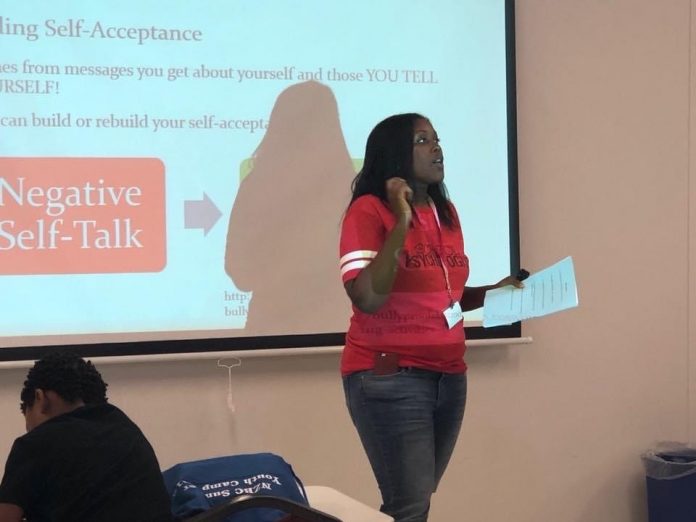Wednesday, Aug. 3, at the opening convocation ceremony, the College of William and Mary President Katherine Rowe honored two members of the College with the President’s Award for Service to the Community. This year’s faculty recipient of the award was Janise S. Parker, assistant professor of school psychology in the School of Education, who was honored for her commitment to community-based research.
Parker, who was born and raised in Florida, received her Bachelor of Science degree in psychology at Florida State University, and then obtained both a Master of Science and a Ph.D. in school psychology at the University of Florida. Parker said she fell in love with the classroom while working as a teaching assistant during her graduate studies, but she decided to pursue a career in academia while completing a post-doctorate program at the University of South Florida.
“They taught me how to do research, how to produce scholarship that is applied and that speaks to a broader audience,” Parker said of her mentors at USF.
But it was important to Parker that she would be able to remain engaged with her community as a full-time academic.
“I remember riding in the car with my husband one day, and I said, ‘Well if I go into academia, I know research is a part of the work we do, but I also want to make sure that my scholarship, my service, everything that I do in some way makes a difference in my community.”
“I remember riding in the car with my husband one day, and I said, ‘Well if I go into academia, I know research is a part of the work we do, but I also want to make sure that my scholarship, my service, everything that I do in some way makes a difference in my community,’” Parker said.
Her combined passions for research and social justice are what brought Parker to the College. She said that she has always been impressed by the emphasis that the College, and especially the William and Mary School of Education, places on applied research.
Much of Parker’s research and scholarship focuses on the experiences of minoritized youth, especially Black adolescents. She writes a blog for Psychology Today called “Culture, Community, and Conscience,” and her recent piece offers advice for adults on how best to support Black and Brown youth as the school year begins. This work is deeply personal for Parker, especially in the context of the College’s history as a colonial institution.
“To be here, to be a faculty member who experiences the freedom to do work that uplifts a group of people that have historically, and we can probably argue contemporarily too, been undervalued, oppressed, bonded, all of those things, for me it’s a way to produce good work, to be productive, but to almost pay homage to those before me and those after me.”
“When I think about the history of William and Mary, how so much of William and Mary came to be because of the enslaved, I think of the quote, ‘I am my ancestors’ wildest dreams,’” Parker said. “To be here, to be a faculty member who experiences the freedom to do work that uplifts a group of people that have historically, and we can probably argue contemporarily too, been undervalued, oppressed, bonded, all of those things, for me it’s a way to produce good work, to be productive, but to almost pay homage to those before me and those after me.”
As part of the President’s Award for Service to the Community, Parker received $500 to donate to the community organization of her choice. She selected Youth Outreach Urban Resources and Services, an organization based in Norfolk. According to their website, YOURS “provides mentoring, tutoring, leadership development, spiritual awareness, and recreational activities” to young people living in Norfolk’s low-income public housing developments. Parker said she started working with YOURS because they were one of the first organizations in Virginia allowing her to conduct community-based research.
“The director, Rob Goodrum, gave me an opportunity to work with his youth and do research with his youth, and he prayed over me and my scholarship,” Parker said. “When I think about the opportunity that he provided, and then, from a spiritual standpoint, really wishing success on the work that I do, for me it made a difference.”
YOURS is by no means the only organization Parker supports through her work. Since coming to Virginia, Parker has worked with faith-based organizations like New Zion Baptist Church in Williamsburg and Fourth Baptist Church in Richmond, as well as public schools in Newport News. These connections are all part of Parker’s identity as a scholar-activist, a term she uses to articulate the intentionality of her work.
“It’s around this notion of producing scholarship that is truly meant to contribute to social change,” Parker said. “It all comes back to how we move as a collective to improve where we are as a society.”
This commitment to the collective not only drives Parker’s research, but it also shapes her understanding of the world and how to change it. She said that her focus on community has been strengthened by seeing how societal structures have been affected by the COVID-19 pandemic.
“No one entity, no one organization, no one person can address these complex issues,” Parker said. “It just continues to reinforce my passion for community work and recognizing that we really can’t do it alone.”

